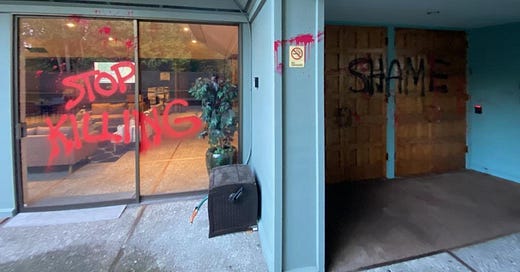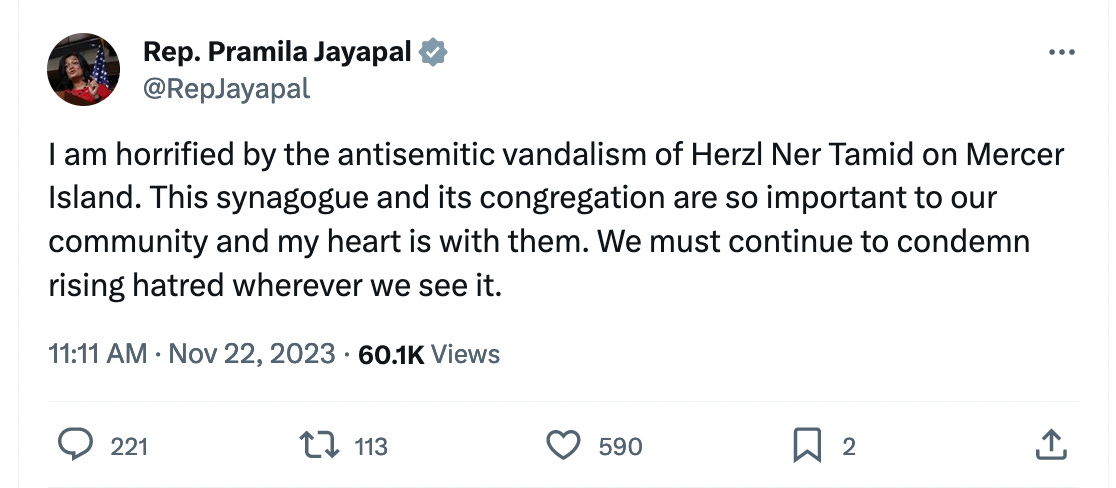So much happened this week that I kept changing the topic of this newsletter.
As I write, 13 hostages have just crossed into Egypt from Gaza during a tenuous ceasefire. Yesterday, protestors demonstrated in front of the Los Angeles home of AIPAC’s president with a banner calling him a “baby killer,” lit off smoke bombs and poured red paint on his property. Protestors also disrupted the Macy’s Thanksgiving Day Parade in New York by gluing their hands to the street and vandalizing the New York Public Library with red paint — specifically the area around a plaque honoring a Jewish donor who gave $100 million to the library, because he is a “zionist billionaire.”
This all came a day after Herzl-Ner Tamid on Mercer Island was tagged with graffiti, including red “blood spatters” the words “ceasefire,” “shame,” “you know better,” “cease fire 4eva,” and “stop killing.” The vandalism was so egregious that Rep. Pramila Jayapal even came out with a statement.
Her critics didn’t waste a minute calling her out for hypocrisy. Earlier this year the far-left legislator called Israel a racist state, and she aligns herself with “the Squad,” who have been effectively calling for a “ceasefire 4eva” and shaming Israel and its supporters. It led me to contemplate where the line is between a chant at Westlake Park and graffiti on a synagogue. They’re both words. They say the same thing. Does Jayapal connect the dots between the vandalism of a synagogue and the terrifying, vitriolic mobs chanting for intifada revolution?
This separation of Jews and Israel when it’s convenient sheds light on a new problem: the sidelining of mainstream Jewish leaders, synagogues, and organizations in favor of a minority of Jews, usually not leaders or even educated in Jewish history, who represent “diversity” of thought around Israel.
Last week, which feels like a month ago, the Seattle Times breathlessly reported on a multifaith rally and “solidarity statement” signed by some 2,000 faith leaders, educators, elected officials, and individuals condemning the violence in Israel and Gaza.
The problem is, no one in the organized Jewish community, including rabbis and leaders with decades of experience doing interfaith community building, was invited to be part of it. Only one pulpit rabbi, David Basior of the progressive Kadima congregation, signed on.
The solidarity statement itself looks benign: it mourns the bloodshed and calls for a ceasefire and envisions “a world of peace and justice in Israel/Palestine, an area that is sacred to people of all three Abrahamic faith traditions.” It could have been a line in a sermon prepared for October 6th.
But it also sets up moral equivalency between the terror attack and Israel’s non-occupation of Gaza and denounces Hamas’s violence, because “this violence occurs in the context of daily injustices under a military occupation of Palestinians.” The idea that Israelis gang rape young women and shoot them in the head or tie family members together and burn them alive all while chanting “God is great” is insane and a modern blood libel. It’s insulting to attribute Hamas’s reign of terror merely on bad Israeli governance.
It’s also becoming a normalized narrative. This week, the City of Seattle commissioned a blog post on the shared decolonization struggle between “Turtle Island” and Palestine. (Turtle Island is a reference to North America — activists are careful not to explain that clearly, because surely they know the idea of violently eliminating the American project is a bad look.) The author of this post celebrates the connective tissue between Native communities here and Palestinian liberation by citing Native American support in the 1970s for the PLO. Yep, that PLO.
The Seattle City Council, also this week, passed a resolution calling for a ceasefire that in reality means the overhaul of the state of Israel by wealthy terrorists who have claimed publicly that they will commit October 7th over and over again. In the words of a press release issued on November 21 by Councilmember Kshama Sawant, “Our movement will claim this historic victory today and fight on. What we won today is a reflection of the balance of forces right now, and it shows we need an even stronger movement in order to address the root causes of the conflict—the Israeli occupation and the US military aid that facilitates the brutalization of the Palestinian people.”
Obviously, the creators of the “multifaith” statement didn’t intend to include any mainstream Jewish opinions, because they knew it wouldn’t fly. Why would they go to the trouble of revising it with all our input? But in not doing so, they surreptitiously made a decision to take a stand on a very raw issue that deeply affects a huge segment of the local multifaith community knowing that it would hurt. I suspect the creators of this statement knew they could pull a fast one on more well-meaning and measured faith leaders and that the media would fall for it, too.
As the article summarizes, without bothering to call up any sources:
Still, many prominent Jewish community organizations and leaders in Washington, such as the Jewish Federation of Greater Seattle, the Anti-Defamation League Pacific Northwest and the American Jewish Committee Seattle, were not involved with the solidarity statement and did not sign it, reflecting how local Jews’ views about the polarizing conflict vary widely. Many support Israel’s ongoing military operations as a means of destroying Hamas and preventing another massacre.
Conveniently, the creators of the statement waited until Israel had retaliated to reposition the conflict as “both sides.” Aneelah Afzali, who helped draft it, is the Muslim Association of Puget Sound’s (MAPS) American Muslim Empowerment Network program. MAPS has had nothing to say to the Jewish community over the past seven weeks. Rather, it has been busy hosting speakers who praise martyrdom and suffering.
Rabbi Anson Laytner, who has decades of experience in the interfaith space, sent an op-ed to the Seattle Times, which they declined to print. Laytner, now retired, was a co-founder of the Interfaith Council of Washington, a past president of Northwest Interfaith, an executive director of Multifaith Works, and adjunct faculty at Seattle University’s defunct School of Theology and Ministry.
I’m happy to share his response to the solidarity statement here.
Faithless in Seattle
Like many of the signatories to the “Solidarity Statement for Peace and Justice in Israel/Palestine,” readers of the Seattle Times article “Faith leaders gather in Seattle to call for cease-fire and hostage release in Gaza” may have been lulled into a tranquil state of mind thinking that, here in Seattle, faith leaders, educators, and others could reach agreement on a balanced and humane approach to the Israel-Hamas conflict.
It is not so much that I have problems with the Statement itself, although I could take umbrage that it did not condemn Hamas’ massacre outright without rationalizing it. Nor will I be offended that it did not mention Hamas’ rejection of Israel’s right to exist, its continuing threats of violence, its intention to expel all Jews if it ever were to triumph, or its use of Gazan civilians as human shields.
My primary grievance lies with those who drafted the Statement. As someone who has worked for forty years in the interfaith field, striving to improve interfaith and interethnic relations, I am calling out the disingenuous approach of the authors of this Solidarity Statement because they disdained true dialogue with the larger Jewish community in favor of working only with those who shared a similar ideological perspective.
Rather than seek out more representative figures from the Jewish community, they chose to start with like-minded individuals, people who shared a perspective that is supportive of the Palestinian cause and singularly critical of Israel.
As a result, nearly all our region’s congregational rabbis, cantors, Jewish educators, and organizational leaders were excluded from helping to craft this so-called Solidarity Statement. (To the best of my knowledge, only two rabbis of the 47 member Washington Coalition of Rabbis have signed on to the Statement.)
To reiterate, I have no real problem with the goals of the Statement itself or its call for a ceasefire, humanitarian aid, and the release of the hostages. But I am deeply bothered by the self-appointed tokenism of its Jewish participants and the willingness of their non-Jewish partners to purposefully exclude more mainstream Jewish perspectives.
As Maxima Patashnik, Director of JCRC and Government Affairs for the Jewish Federation of Greater Seattle, wrote, “where this statement misses the mark is in its claim of solidarity with the Jewish community. There can be no solidarity without allyship, and allyship requires inclusion.”
By excluding major Jewish organizations and their representatives from the deliberation process, the authors engaged in a deceit that has misled many well-intentioned people into believing there was consensus and solidarity when none was ever even attempted.
I don’t know how the Seattle Times decides what to print. Perhaps they’re playing it safe and trying to stay out of the crossfire of accusatory opinion pieces. I wouldn’t blame them for this. But for all their bleating about how local journalism is dying and needs to be saved, they might do well to ask themselves if they’re part of the downfall.
Tragically, one can see how actual genocides can happen when legacy media outlets and elected officials assert their authority and then carelessly ignore facts while claiming objectivity. Jews are the guardians of history. We’ve seen this show before. It would be nice if more people would listen.
I want to end with a message of hope, because despite this dire observation, I do believe there is hope and that we will succeed. I always think of George Washington’s 1790 letter to the Jews of Newport on Thanksgiving, when I reflect on how good this country is and how hard we have worked to make it better and not pulled down by destructive, chaos-loving ideologies. In the words of our first (flawed, yes, but visionary) leader:
May the children of the stock of Abraham who dwell in this land continue to merit and enjoy the good will of the other inhabitants — while every one shall sit in safety under his own vine and fig tree and there shall be none to make him afraid.
May the father of all mercies scatter light, and not darkness, upon our paths, and make us all in our several vocations useful here, and in His own due time and way everlastingly happy.
Community Announcements & Resources
Check out the Seattle Jewish community calendar and the virtual calendar.
Candlelighting in Seattle is at 4:06 p.m. The parasha is Vayetzei.
Mercaz Seattle will be running its Building Together Crowdfunding Campaign from December 3-5, 2023 for its next Mercaz home. Learn more and contribute at http://mercazseattle.org/capital-campaign. Tizku l'mitzvot!
The Klezmatics will perform at Town Hall on December 7.
List of events on the Federation website
Linktree of advocacy tools, ways to help and donate to specific kibbutzim and causes, from uXeptable
Another comprehensive list organized by Israelis for donations to specific causes
Have an event you want to share? Reply to this email or send it to thecholentseattle@gmail.com.





This is all maddening. And, parents, watch your children's social media. My kid came to me last night about a TikTok video that they saw that totally glosses over Hamas's terror attack and highlights Israel's retaliation as an act of terror. It also ignores history and claims that Israel has been pushing out and murdering Palestinians for decades in order to steal the land. I had a very long chat with my kid but am appalled that this is the one-sided, racist narrative floating around. I'm grateful my kid came to me because, even though they're Jewish, they were buying into all of it.
Great piece Emily. This line: “It’s insulting to attribute Hamas’s reign of terror merely on bad Israeli governance.” is so well put.